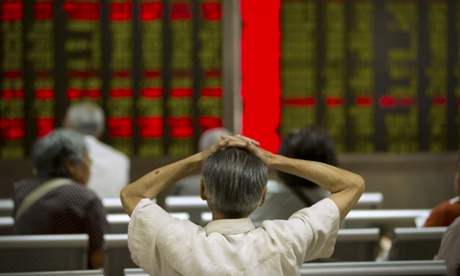Chinese share prices have bounced back after the latest emergency measures by policymakers to underpin the country’s fragile stock markets appeared to have increased confidence.
Investors in China’s markets have endured a white knuckle ride in recent weeks, with prices on the Shanghai Composite index plunging by 8.5% on Monday alone – the sharpest sell-off in eight years – as trading in many stocks was suspended. But following a second day of declines the index closed up 3.5% on Wednesday.
Beijing has again signalled its determination to restore calm to rattled markets, including providing loans to buy shares and put a floor under falling prices. The latest measures followed a series of moves in recent weeks, including banning short-selling.
The more stable mood in Shanghai was echoed in the US, where the Dow Jones industrial average was trading up 101 points, or 0.6%, at 17,731, at lunchtime. In London, the FTSE 100 index also closed up 1.2% at 6,631.
However, some analysts also fear the bursting of the Chinese stock market bubble in recent weeks may augur a downturn in the wider economy. Chinese GDP growth has slowed from the double-digit annual rates seen in the runup to the global financial crisis. This follows a deliberate shift by the authorities from export-dependent growth to stronger domestic consumption.
The latest official figures showed annual growth of 7% – in line with Beijing’s target – but analysts at City consultancy Fathom say their calculations, based on measures including electricity use and bank lending, suggest the true rate is less than half that.
Fathom’s Laura Eaton said Beijing may eventually be forced to engineer a sharp depreciation in the yuan in order to restore competitiveness and increase growth. “As China tries out the full range of its policy levers, we believe that eventually it will resort to exchange-rate depreciation,” she said.
Salman Ahmed, of asset manager Lombard Odier, said China’s vast $4tn (£2.6tn) foreign currency reserves meant it had considerable capacity to continue underpinning financial markets, but that the volatility of recent weeks would still hit economic growth.
“Growth is likely to take a further blow as both wealth effects and sentiment, hit as a result of equity market volatility, pass through the system,” he said. “Already the heavy falls in commodities show that this dynamic has accelerated and, more importantly, is likely to remain with us going forward.”
There have also been growing questions about whether such direct intervention in financial markets undermines China’s attempt to prove its credentials as a fully fledged, free market economy.
“Some of the things they’ve done have been, to a degree, irrational,” said Sat Duhra, fund manager at Henderson Global Investors. “It’s very important that if China does want to be seen as a credible destination for foreign capital, then some of these things have to be more measured and thought out.”











